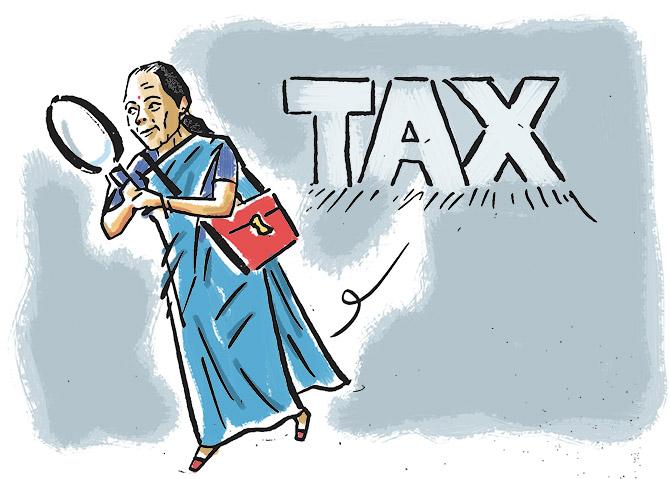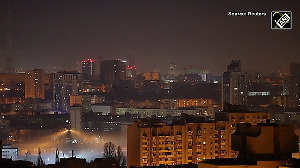'When you need to revive the economy, when you need to revive aggregate demand, you cut taxes.'
'But what's this government doing?'
'It's increasing taxes for the middle class and the vast majority of the poor on fuel, which has a ratchet effect on most other products.'

Will the RBI's sudden decision to increase the repo rate hike bring down inflation?
Will it increase employment?
Will it increase demand in the market?
Will the lending cycle start?
"Please remember that inflation, especially food inflation, has been very high in the last two years. And the government is responsible for this, not so much the RBI," human development economist Professor Santosh Mehrotra, Visiting Professor, Centre for Development, University of Bath, UK, and Research Fellow at the IZA Institute of Labour Economics, Germany, tells Rediff.com's Shobha Warrier.
The first of a two-part interview:
When unemployment is high and when there is no demand in the market, should the RBI be hiking the repo rate citing inflation as the reason?
Yes; for the simple reason that the RBI increasing the repo rate barely makes an impact on inflation.
It is the increase of CRR (cash reserve ratio) that reduces liquidity and will have an impact.
The impact of repo rates on inflation are limited. If you look at the composition of the consumer price index, you will see that in urban areas, 45% of CPI is accounted for by food items, and 5-6% by fuel.
But in the rural areas, food accounts for 55% of CPI, and a slightly higher share is accounted for by fuel.
It means, what accounts for over half of the weight in the CPI are food and fuel.
The RBI repo rate has practically no impact on these two items.
However, on the remaining items, the so-called core inflation, is affected by the repo rate.
So it was appropriate for the RBI to raise rates since there is a limit beyond which, after a recession, mthe arket rates of interest should remain in negative territory.
Real interest rates were in negative territory for a significant period as inflation was running.
If real interest rates remain in negative territory for long periods, it means that the borrower is paying back less than he actually borrowed; in other words, there is practically no cost to borrowing.
Why do you say so?
In the case of food, most of the transactions in our highly informal agriculture sector, whether it is production, distribution or consumption, takes place in cash.
It does not take place using any credit at all, least of all credit from the banks.
So, unlike in a much more formalised economy, where the monetary policy, specifically the repo rate, has a significant impact on actual credit, that is not the case in a highly informalised cash transaction-based economy.
So, what will be impacted by the repo rate hike?
What is impacted by the RBI's repo rate is the remainder which is not more than 45% weight in CPI, that's manufactured products which is called core inflation.
I don't expect the repo rate to have much of an impact on inflation.
Please remember that inflation, especially food inflation, has been very high in the last two years.
And the government is responsible for this, not so much the RBI.
Not the pandemic?
Yes, covid did disrupt supplies, and supply chains, but that happened only during the lockdown.
In recent times, what has impacted the supply chain is the Ukraine war which is only a 2-3- month-old phenomenon.
So, most of the problem is caused by government policies.
This government had been facing a silent fiscal crisis before covid began.
That was because it had made major policy mistakes that led to a decline in the growth rate.
As a result of which its own tax revenues were falling even before 2019.
Because of demonetisation?
Demonetisation and GST. But those were not the only ones; there were many other policy mistakes along the way.
For example, exports collapsed. When this government came to power, exports were $315 billion.
After 2014, it collapsed and never recovered to $315 billion in the next 5 years of this government.
Back to the inflation that the economy is facing right now.
As per the RBI bulletin data, food inflation climbed to 31% between July 2020 and July 2021.
This was happening in a whole series of products in the food sector like oil seeds, vegetables, cooking oil, etc.
The question is, why was it happening?
After having bankrupted itself before covid, it had to increase public spending during covid.
Due to its very poor management policies during covid, the collapse of the Indian economy was much greater than in the majority of G-20 countries.
Now, the way in which this government has increased petrol, diesel and gas prices is nothing short of catastrophic for the economy.
But they blame it on the worldwide fuel price hike due to the Ukraine war...
They can blame anything and everything on somebody else but themselves!
They blame it on the oil bonds taken by the previous government to pay for the fuel subsidies the government was giving to the population.
In 2014, the value of oil bonds was Rs 70,000 crore.
Do you know how much has the current government has raised over 8 years on the strength of excise duties and cesses on petrol, and diesel in India? Rs 26 lakh crore!
You divide that by 8 years, and you will get more than Rs 3 lakh crore every year.
When the global economic crisis hit and oil prices were quite high during the UPA period, we cut taxes in order to trigger an increase in domestic consumption demand, which would have a multiplier effect on an economy facing due to exogenous factors; factors beyond the control of the national government.
That's what fiscal stimulus is meant to be all about.
When you need to revive the economy, when you need to revive aggregate demand, you cut taxes. But what's this government doing?
It's increasing taxes for the middle class and the vast majority of the poor on fuel, which has a ratchet effect on most other products.
This is the opposite of macro-economics 101.

But the government blames the UPA for the economic mess....
It's a political ploy, that's all. What economic mess are they talking about?
From 2004-2014, the economy was growing at 8% per annum, the highest in India's post-Independence history.
The growth rate started collapsing after 2015, thanks to the government's policies.
Feature Presentation: Aslam Hunani/Rediff.com











 © 2025
© 2025